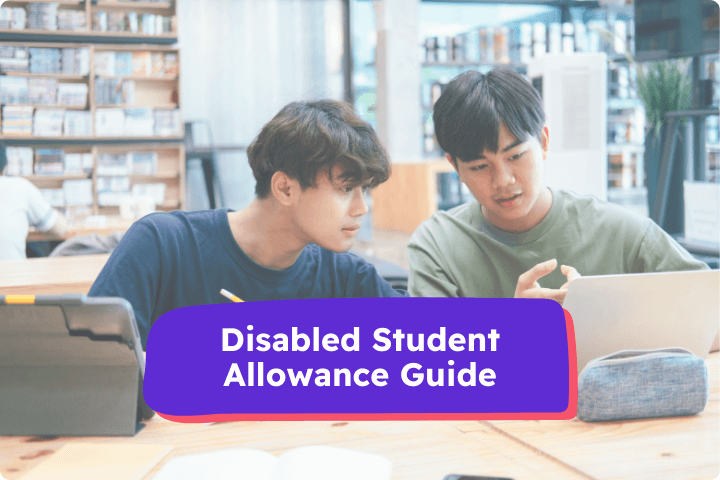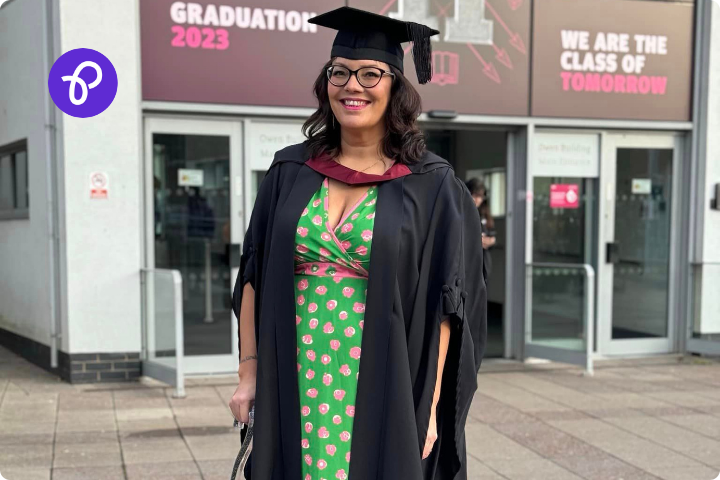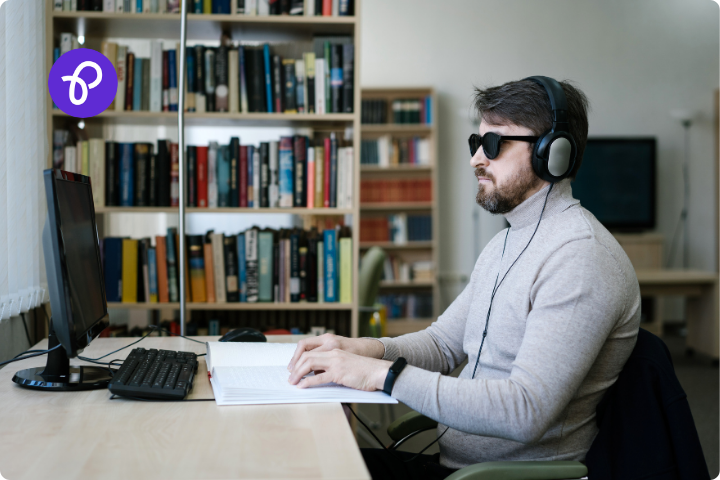All Articles
9 min read
How to Get Help as a Disabled Student – DSA
Written by
Purpl
Published on
December 13, 2024

My name is Sam and I live with chronic illness and chronic pain, I work for Purpl creating stories from our disabled community and sharing information that is helpful, interesting or just a great read! As a disabled woman, I understand the extra costs of living with a disability and I love getting to share the incredible discounts and deals we source for you. I am also in the middle of studying for my Masters Degree in Disability Studies, Rights and Inclusion and finished my degree in Fine Art in 2023 and so today I wanted to share important information for disabled students, Disabled Student Allowance.
Disabled Students’ Allowance (DSA) provides financial support to disabled students in the UK to help them overcome the unique challenges they may face in higher education. If you have a disability, mental health condition, specific learning difficulty, or other long-term health issue, DSA can help cover additional study-related costs, enabling you to thrive academically. DSA do not fund items or costs related to your disability that you would have regardless of whether or not you were studying. Here’s a comprehensive guide on how to claim DSA.

- What is Disabled Students’ Allowance?
- Who is Eligible for DSA?
- What Can You Use DSA for?
- Your Step-by-Step Guide to Claiming DSA
- What to Expect During Your DSA Needs Assessment
- Key Tips for a Successful DSA Application
- Other Support Through Disabled Support Services in University
- What Does an Individual Learning Plan Look Like?
- Final Thoughts on Claiming DSA
What is Disabled Students’ Allowance (DSA)?
Disabled Students’ Allowance (DSA) is a financial aid provided by the UK government to support disabled students in higher education. DSA can help with costs associated with extra learning aids, specialist equipment, personal support, and travel expenses. It is a grant rather than a loan, meaning you don’t have to repay it. Importantly, DSA does not depend on your household income, making it accessible for eligible students who qualify based on need.
Who is Eligible for DSA?
To qualify for Disabled Students’ Allowance, you must:
- Be a current or prospective undergraduate or postgraduate student enrolled in a course that lasts at least one year.
- Be a UK resident
- Have a disability, long-term health condition, mental health condition, or specific learning difficulty such as dyslexia or ADHD
What Can You Use DSA for?
Students use Disabled Students’ Allowances (DSA) to access vital support that enables them to succeed in higher education and reduce the barriers of impairments, illness or learning disabilities. By addressing the unique barriers students face, DSA ensures they can engage fully with their academic responsibilities and participate in university life on a more equal footing with their peers.
Here’s a list of things a student can use Disabled Students’ Allowances (DSA) for in the UK:
Specialist Equipment
- Laptops or desktop computers with assistive software
- Screen readers or text-to-speech software
- Speech recognition software
- Mind-mapping software for planning and organization
- Ergonomic furniture (e.g., adjustable desks, chairs)
- Assistive items that may allow you to use a laptop from bed or a sofa
- Special keyboards or mice
- Recording devices for lectures
Personal Support Services
- Specialist tutors for specific learning difficulties (e.g., dyslexia)
- Mental health mentors for emotional and psychological support
- British Sign Language (BSL) interpreters
- Note-takers for students with physical or sensory impairments
- Study skills mentors to develop organizational and learning strategies
- Proofreaders (within certain guidelines)
Assistive Technology Training
- Training to help students use specialized software and equipment effectively
Travel Expenses
- Additional travel costs incurred due to a disability (e.g., taxis if public transport is inaccessible)
General Academic Support
- Printing and photocopying costs directly related to the disability
- Consumables like paper and ink (if necessary due to the disability)
Other Costs
- Specific items related to the student’s disability, as assessed by the needs assessment report.
DSA is tailored to meet individual needs, so the exact support depends on the student’s circumstances and assessment.
Your Step-by-Step Guide to Claiming DSA
Step 1: Gather Your Documentation
You’ll need proof of your condition to apply for DSA. This may include:
- A formal diagnosis or report from a medical professional for physical or mental health conditions
- An educational psychologist’s report or specialist’s assessment if you have a learning difficulty
Make sure these documents are up to date and clearly describe your condition and its impact on your ability to study.
Step 2: Apply for Student Finance
To apply for DSA, you generally need to be eligible for other types of student finance, although you can apply for DSA separately. Applications are processed through Student Finance England, Wales, Scotland, or Northern Ireland, depending on where you live.
- If applying for other student finance, you can apply for DSA at the same time by completing the DSA section.
- If you’re only applying for DSA, you can download and submit the DSA application form from your relevant student finance website.
Step 3: Submit Your Application
Once you’ve filled in the application form and gathered the necessary documentation, submit them to the relevant student finance body. Allow at least six weeks for processing, as applications are reviewed individually.
Step 4: Attend a Needs Assessment
If your application is accepted, you’ll be asked to attend a needs assessment at an approved assessment centre. This could be in person, online or over the phone. During the assessment, a professional will review your requirements and suggest necessary support measures, including any assistive technology, mentoring, or study skills support you may need. This step is crucial, as it helps determine the specific allowances you’ll receive.
Step 5: Receive Your DSA Report
Following the assessment, you’ll receive a DSA report detailing the support and funding you’re eligible for. This report will outline the recommendations for equipment and support tailored to your needs.
Step 6: Access Your DSA Support
Once approved, you can start accessing your DSA support. Payments are usually made directly to suppliers or service providers, and you may be reimbursed for certain approved expenses. Check the terms carefully to ensure you comply with usage guidelines.

What to Expect During Your DSA Needs Assessment
A Disabled Students’ Allowances (DSA) needs assessment is a personalized process to identify the specific support and resources you need to succeed in higher education. Here’s what you can expect:
Pre-Assessment Preparation
- Appointment Confirmation: You will receive confirmation of your appointment, typically with details about what to bring (e.g., medical evidence, course details).
- Medical Evidence Review: Any documentation confirming your disability or condition will be reviewed before the meeting.
- Background Information: You may be asked to complete a questionnaire about your disability, course, and study methods in advance.
The Assessment Process
The assessment itself is not a test but a discussion with a trained assessor to understand your needs.
Introduction
- Explanation of the purpose of the assessment and what it involves.
- Discussion of your academic course, study methods, and challenges you face due to your disability.
Discussion of Needs
- Learning Needs: Discussion of how your condition affects your ability to study (e.g., concentration, reading, writing, mobility).
- Support History: Review of any previous support you have received in education or elsewhere.
- Daily Challenges: Exploration of how your disability impacts tasks like attending lectures, taking notes, using equipment, or accessing materials.
Recommendations
The assessor will suggest specific support and equipment based on your discussion:
- Assistive Technology: Recommendations for software and equipment (e.g., laptops with screen readers, mind-mapping tools, ergonomic furniture).
- Personal Support Services: Suggestions for specialist tutors, mental health mentors, or note-takers.
- Adjustments: Advice on exam accommodations, alternative formats for course materials, or campus accessibility.
- Travel Support: Recommendations for additional travel costs if public transport is inaccessible.
Post-Assessment Process
- Assessment Report: After the meeting, the assessor will write a detailed report summarizing your needs and recommended support.
- Review and Approval: The report will be sent to your funding body (e.g., Student Finance England) for review and approval.
- Implementation: Once approved, the recommended equipment and services will be arranged and provided.
Key Points to Remember
- The assessment is informal and focused on finding practical solutions.
- You can ask questions or raise concerns throughout the process.
- The recommendations are tailored to your individual needs and the demands of your course.
- The goal of the needs assessment is to ensure you have all the resources necessary to thrive in your studies.
Key Tips for a Successful DSA Application
- Apply Early: Start the application process as early as possible to ensure you receive the necessary support by the start of your course.
- Double-check Documentation: Missing or incorrect documentation can delay your application. Review all paperwork to avoid errors.
- Prepare for the Needs Assessment: Think about the types of challenges you face and discuss potential support strategies with your assessor.
- Stay Informed: Keep in touch with your student finance body for updates, as they can notify you of any delays or additional information required.
- Be Honest: It is important that you are very clear on all your access needs, from the day-to-day things, through to needs that may be fluctuating. Think through from start to finish, from travel to whether you can sit in a lecture theatre for longer periods, to whether you need a certain seat within a lecture theatre. If you already claim PIP, looking through your PIP assessment may help you.
Other Support Through Disabled Support Services in University
Disabled Students’ Allowance is a great financial tool to support disabled students, but it doesnt end there. Disabled students in the UK can expect a range of support from their university through Disabled Support Services, designed to help them overcome barriers to learning and fully participate in university life. Here’s what they can typically expect:
Personalised Support Plans
- Creation of an Individual Learning Plan (ILP) or equivalent, outlining reasonable adjustments for assessments, lectures, and campus accessibility.
Academic Adjustments
- Extra time in exams and coursework extensions
- Alternative formats for course materials, such as large print, Braille, or audio versions
- Lecture capture or recording permissions
- Accessible online resources and virtual learning environments
Specialist Support
- Assistance from specialist tutors for learning disabilities like dyslexia or dyspraxia
- Mental health mentoring for students with mental health conditions
- Access to disability advisors or caseworkers for tailored advice and support
Physical Accessibility
- Adapted accommodation for students with physical disabilities or mobility issues
- Accessible lecture halls, libraries, and other campus facilities
- Priority seating or space in classrooms
Assistive Technology and Training
- Support in applying for and using assistive technology, such as screen readers or dictation software
- Access to computer labs with assistive technology pre-installed
Communication Support
- British Sign Language (BSL) interpreters or communication support workers
- Note-takers or scribes for lectures and seminars
Work Placement or Study Abroad Support
- Guidance on reasonable adjustments for work placements, internships, or study abroad programs
- Liaison with external organizations to ensure accessibility
Well-Being and Community Support
- Peer support groups or forums for disabled students
- Well-being or counseling services on campus
- Disability-related extracurricular activities or events
Liaison with DSA
- Assistance with the DSA application process
- Help coordinating support provided through DSA with university services
Free or Discounted Council Tax
Households where everyone’s a full-time student do not have to pay Council Tax. If you do get a bill, you can apply for an exemption.
To count as a full-time student, your course must:
- last at least 1 year
- involve at least 21 hours study per week
You’ll get a Council Tax bill if there’s someone in your household who’s not a full-time student, but your household might still qualify for a discount.
Universities are legally required under the Equality Act 2010 to make reasonable adjustments for disabled students, so the exact support offered will vary depending on the student’s needs and the resources available at the institution.

What Does an Individual Learning Plan Look Like?
An Individual Learning Plan (ILP) for a student with a disability typically provides a structured outline of the support and adjustments they need to ensure equitable access to their education. While the exact format may vary by institution, an ILP generally includes the following sections:
Student Information
- Name: The student’s full name.
- Student ID: University or college identification number.
- Course Details: Name of the course, level of study, and department.
- Contact Information: Email or phone number for the student.
Disability or Condition
- A brief description of the student’s disability, medical condition, or learning difficulty (e.g., dyslexia, autism spectrum disorder, mobility impairment).
- Relevant medical or diagnostic information (with consent to share).
Key Barriers to Learning
- Specific challenges the student faces due to their disability (e.g., difficulty processing large amounts of text, issues with mobility around campus, or concentration difficulties).
Recommended Adjustments
A detailed list of reasonable adjustments or accommodations, which may include:
- In-Class Adjustments:
- Permission to record lectures.
- Provision of lecture slides or notes in advance.
- Use of assistive technology during lessons.
- Assessment and Exam Adjustments:
- Extra time in exams (e.g., 25% additional time).
- Use of a separate, quiet room for exams.
- Alternative formats for assessments (e.g., oral presentations instead of written exams).
- Accessibility Adjustments:
- Accessible seating or priority seating arrangements.
- Adjustments to classroom locations for mobility needs.
- Access to an elevator or adapted facilities.
Support Services
- Details of additional support available, such as:
- Specialist tutors for academic skills (e.g., for dyslexia).
- Mental health or disability mentors.
- Note-takers or sign language interpreters.
- Peer support or group sessions for students with similar needs.
Assistive Technology
- A list of recommended assistive technology or software (e.g., screen readers, dictation software, ergonomic equipment).
- Details on training for using this technology, if applicable.
Communication Preferences
- How the student prefers to be contacted and communicated with (e.g., email, face-to-face, via an app).
- Any specific requirements for written communication (e.g., plain English, large print).
Roles and Responsibilities
- Student’s Role: Responsibilities such as attending arranged support sessions, using assistive technology provided, and communicating changes in needs.
- University’s Role: Commitments such as providing the agreed adjustments, maintaining confidentiality, and ensuring a contact point for disability support.
Review and Monitoring
- Dates for review meetings to assess the effectiveness of the adjustments and update the ILP as needed.
- Contact information for the disability advisor or relevant support staff.
Signatures and Consent
- Signatures from the student and the disability support officer or advisor, confirming agreement on the content of the ILP and consent to share it with relevant parties (e.g., lecturers, exam coordinators).
The ILP is a dynamic document tailored to the student’s needs and may evolve over time to reflect changes in their condition, course demands, or feedback from the student and staff.
Final Thoughts on Claiming DSA
Claiming Disabled Students’ Allowance can be a significant step toward creating an accessible, supportive learning environment. From covering the cost of specialised software to funding personal support services, DSA is designed to level the academic playing field, helping students to focus on their studies. You can find lots of information about further education on the UCAS website.
DSA has made a great impact in my own studies, allowing me to study in further education when I believed the barriers would be too high. It saddens me when I hear of students leaving education due to a lack of support and so I wanted to share this today in the hope of spreading information and aiming to get the right support to the people who need it most.
Related Articles for Disabled Benefits and Savings
PIP Discounts and Freebies 2024
How to Apply for the Disabled Person’s Railcard
Access Card: How to Apply and Why It Helps Disabled People
